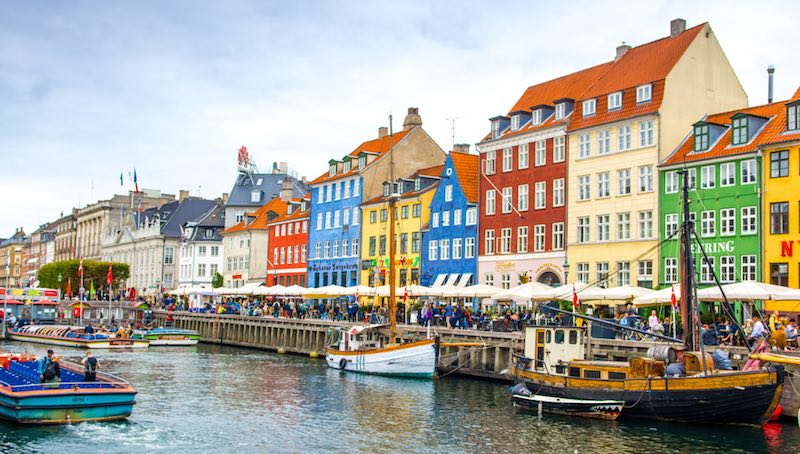Venture capital funding broke records in the biotech industry in 2021. Leading startup incubators from across Europe share their plans to make the most of this trend in 2022, with expectations for big returns and expansion in the works.
In spite of financial volatility resulting from the Covid-19 pandemic, the year 2021 broke records for funding going to life sciences investment firms in Europe. With fresh cash in hand, investors will be increasingly on the lookout for promising biotech startups across Europe.
This trend stands to benefit Europe’s biotech startup incubators, which strive to get their resident companies fuelled beyond the seed stage by venture capital (VC) investments.
“The year has been exceptional not only for startups or biotechnology in general, but also in terms of investment in the life sciences industry and the development of existing companies,” said Gediminas Pauliukevičius, Head of Vilnius City Innovation Industrial Park (VCIIP) in Lithuania.
One benefit of the swelling VC spending power for startup incubators is that the startups stand a higher chance of grabbing the attention of VCs and other investors. This leads to more deals and exits, in turn channeling more funding to startup incubators to fuel their activities. In addition, fledgling companies are obtaining funding earlier, speeding up their development.
In response to the favorable conditions, four life sciences institutes and incubators across Europe explain why their expectations are high for 2022.
Related Content

BioInnovation Institute
The BioInnovation Institute (BII) was launched in Copenhagen, Denmark, in late 2017 to support biotech startups across medical and industrial fields. This week, the BII hit a major funding milestone: its portfolio companies have raised more than €147M (DKK 1B) in investments since its inception.
“We had expected to hit this number in 2023,” said CEO Jens Nielsen, adding that the growth in funding across Europe has exceeded the team’s expectations.
Fuelled by €470M in funding from the Novo Nordisk Foundation, the BII aims to double the number of startups coming under its wing from 12 in 2021 to 24 in 2022. The institute also expects to expand existing startup creation programs in addition to opening up a new one.
Also this week, the BII received a grant from the Bill and Melinda Gates Foundation to bankroll research into improving women’s health. The BII plans to build awareness and identify startup opportunities in the field.
While the UK and Switzerland have some of the most active biotech hubs, Nielsen sees the Nordic region’s clusters as competitive runners up. “I think Copenhagen comes in as a very strong position thereafter,” he told me. The Novo Nordisk Foundation will continue to be one of the key drivers for building up the biotech startup scene in Denmark.
Vilnius City Innovation Industrial Park
The VCIIP brands itself as the first industrial park in Lithuania’s capital city dedicated to the development of startups, and has been operating since 2018. In collaboration with Vilnius University and several life science companies, the center has the ambition to build the foundations of Lithuania’s emerging biotech startup ecosystem.
Related Content
This year, the VCIIP is spending €10M on the construction of a life sciences startup incubator equipped to support research in molecular diagnostics, infectious diseases, bioinformatics, and other disciplines.
“Since 2019, Vilnius City Innovation Industrial Park has identified life sciences as a priority direction for clustering,” said Pauliukevičius. “The sector is growing rapidly, and the startups that usually are created within the university grounds need specialized laboratories and equipment that, in the initial stages of growth, they cannot afford.”
The year 2022 will be spent designing and commencing construction of the startup incubator, with the aim of opening its doors by the end of 2023.

Venture Kick
Venture Kick was founded in Zurich, Switzerland, in 2007. The startup funder supports Swiss entrepreneurs across multiple sectors including biotechnology and medtech. The overall goal is to accelerate the progress of spinoff companies from Swiss universities.
For 2022, Venture Kick has planned an overall budget of €5.8M (CHF 6.1M), 10% more than in 2021. Up to €2.8M (CHF 3M) of the total is earmarked for life sciences startups, with up to 40 biotech companies expected to enter the program this year.
In addition to financing, Venture Kick will continue to provide mentoring and networking opportunities to the successful candidates in its program.
As Venture Kick’s resources grow, its co-managing director, Jordi Montserrat, sees a parallel development in the Swiss biotech scene overall.
“We see the ecosystems strengthening; new biotech parks keep emerging or growing with more capacity, such as Biopôle,” said Montserrat. “Switzerland keeps at the top of countries recognized in the life science sector, with Basel, Zurich, and Lausanne being top hubs in the field.”
Start Codon
Start Codon was founded in 2019 in the world-famous Cambridge life sciences cluster in the UK. Backed by an €18M (£15M) fund raised in 2020, Start Codon’s mission is to identify startup opportunities in the region and drive its companies towards seed rounds and beyond.
The budget for 2022 will be up to €3.6M (£3M), which will be used to support up to 12 companies. This target is roughly equivalent to that for 2021. According to Daniel Rooke, Start Codon’s co-founder and COO, this plan ensures that the organization can continue supporting startups already under its umbrella.
However, Rooke told me that Start Codon has seen huge investor interest in its portfolio companies. Therefore, big follow-on fundraisings are anticipated throughout the course of 2022.
“2021 saw unprecedented levels of investment in UK venture-funded companies, particularly in the UK tech and life sectors and particularly from Series A onwards,” said Rooke. “We expect this upwards investment trend to continue and for 2022 to be another record-breaking year.”

Challenges and opportunities ahead
Though the European biotech startup scene has never had a better VC funding situation, there are challenges to address. One is the lack of European research being translated into industrial applications compared to other parts of the world.
“I still think that there is a lot of potential in European science that is not exploited in this space, particularly if we compare it with the hotspots in the US,” said Nielsen. “I think much more can be done.”
Another gap is a lack of investors in the earliest stages of a biotech company’s lifespan, even in well-funded European hotspots such as the UK.
“It is still not plain sailing or necessarily easy for companies in the life sciences and healthcare sectors to get off the ground,” said Rooke. “Compared to tech, there is still a lack of investors at the very early stages who are prepared to provide a healthy investment at the outset to get these companies off the ground.”
One of the reasons for these difficulties is that biotech investors are often reluctant to risk their capital on early-stage plays. The BII, Start Codon, and other similar startup incubators across Europe are making progress at bridging the gap and making early-stage companies more appealing to investors.
Another issue is that VC firms are often focused on companies developing technology in hot areas like oncology, neurological disorders, and orphan conditions. Companies outside of these key focus areas may be left behind.
“We do have companies in other spaces but they typically have more difficulties raising financing,” said Nielsen. “And I think that trend will continue, with the VCs in these product spaces still being relatively conservative.”
Nevertheless, one space to watch this year will be the bioindustrial sector, said Nielsen, as many tech investors move into the field. In particular, funding is exploding in cultured meat, plant-based meat, and other novel foods.
“There are so many drivers now both from a ‘saving the planet’ kind of perspective, but also from a health perspective,” said Nielsen. “We have reached a tipping point and therefore we will see more and more innovation in that space.”
Cover image via Elena Resko
"Startup" - Google News
January 13, 2022 at 08:10PM
https://ift.tt/3qqcWCW
Biotech Startup Incubators Prepare to Cash in on Record VC Funding - Labiotech.eu
"Startup" - Google News
https://ift.tt/2MXTQ2S
https://ift.tt/2z7gkKJ

No comments:
Post a Comment